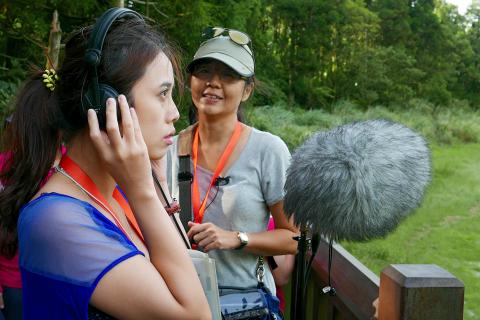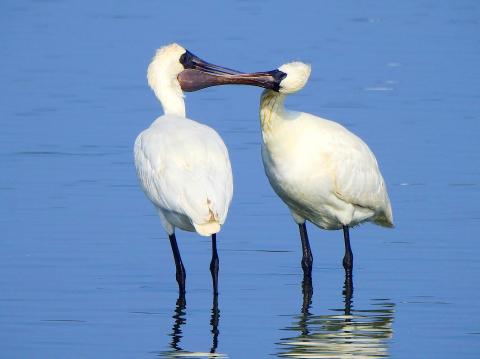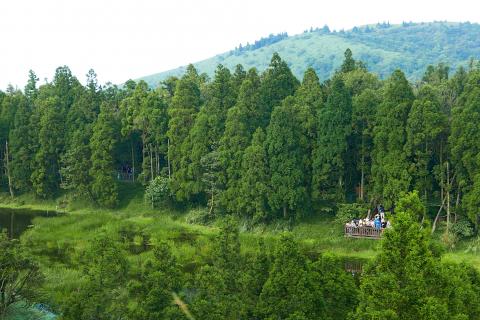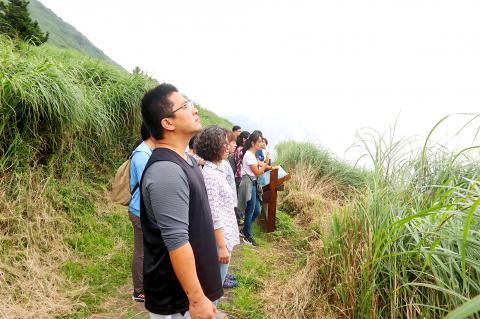Lin Kun-hai (林昆海) says that for many karaoke in the mountains is a popular way to finish a hike.
“Taiwanese are not big on tranquility,” says Lin, the director-general of the Kaohsiung Wild Bird Society.
But on Taiwan’s only nationally-recognized “quiet mountain trail” (寂靜山徑) — 1,840m above sea level by the banks of Cueifong Lake (翠峰湖) in Yilan — silence reigns. A menagerie of birdcalls pierces the air with startling clarity.

Photo courtesy of Taiwan Soundscape Association
To soundscape advocates, listening to nature and cultivating quietude can ironically be the best way to learn how to live with other people.
“Before we open our mouths to find fault with or chide someone, can we take pause?” asks Hsieh Wen-chi (謝文綺), a coordinator of Taiwan Listening Day, which for the past two years has been designated on July 17.
From today until August 24, the Taiwan Soundscape Association is turning up the volume on the nation’s aural heritage through a series of listening tours in Taipei, Taichung and Kaohsiung. Led by soundscape, wildlife and urban rejuvenation specialists, this is the first time that activities are taking place outside the capital.

Photo courtesy of Taiwan Soundscape Association
The program starts today with a sunrise listening tour along the Alishan Forest Railway (阿里山林業鐵路) in Chiayi. Blending urban and rural settings, different tour sites reflect the varied tones of Taiwan’s development and co-existence of human and natural habitats.
In Taipei and Taichung, for example, participants learn to approach the familiar scene of each city’s Zhongshan Road with new ears. Other locations include Yangmingshan (陽明山) and Yuanshan (圓山) in Taipei as well as Taichung’s Dakeng trail (大坑) and Taichung Park (臺中公園). In Kaohsiung, highlights include a former navy ship-making facility and the endangered Cieding Wetlands (茄萣濕地), home to the black-faced spoonbill.
Soundscape advocates want to equip participants not just with a deeper capacity for listening, but also a deeper respect for their fellow creatures.

Photo: CNA
“Sound demonstrates the power struggle between humans and nature,” Lin says.
For Laila Fan (范欽慧), founder and chairperson of the Taiwan Soundscape Association who first led the push for a “quiet mountain trail” in 2013, listening deeply to natural as well as human-made sounds is a way of forging equality and environmental conservation
“Sounds of nature tend to be interpreted as the background music to human activity,” Fan says. “Through Taiwan Listening Day, we are elevating them to the same position as human-made sounds.”

Photo courtesy of Taiwan Soundscape Association
As Taiwan continues to develop, those sounds are also changing. Hsieh says that local parks are increasingly transforming into gathering places for migrant workers. Rather than keeping migrant communities at a distance, a sound tour of Taichung Park seeks to reacquaint locals with their changing city.
“[Migrant workers] will continue to interact closely with us,” Hsieh says. “There’s no question about it. So we have to pursue more cultural exchange and demonstrate Taiwan’s diversity.”
The young are a natural audience for the activities, given the interactive nature of learning about heritage and history through sound. But soundscape advocates say that encouraging adults to listen more keenly to the voices of the younger generation is an objective in itself.

Photo courtesy of Wade Lee
“Most young people are always being informed or told of others’ thoughts and opinions,” says Tu Chun-ching (凃峻清), National Taiwan University history undergraduate and editor-in-chief of Rail Youths (鐵道青年) magazine. “As youths, we hope for the possibility of hearing other types of sounds.”
Countries around the world have long primped their skylines and landscapes for global consumption. Soundscapes are rarely given much consideration, although Fan says they can be as unique as a fingerprint.
In Taiwan’s case, that may be a matter of national pride and survival.

Photo courtesy of Taiwan Soundscape Association
“Taiwan’s voice is not listened to by the rest of the world,” Fan says. “Even if the world can’t hear us, we should at least be willing to hear ourselves.”
■ Tours are conducted in Mandarin. All tours in Taipei are fully registered, while some places remain for tours in Taichung and Kaohsiung. Most are free, but online registration is required at: www.soundscape.org.tw/2019-listening-day.

Towering high above Taiwan’s capital city at 508 meters, Taipei 101 dominates the skyline. The earthquake-proof skyscraper of steel and glass has captured the imagination of professional rock climber Alex Honnold for more than a decade. Tomorrow morning, he will climb it in his signature free solo style — without ropes or protective equipment. And Netflix will broadcast it — live. The event’s announcement has drawn both excitement and trepidation, as well as some concerns over the ethical implications of attempting such a high-risk endeavor on live broadcast. Many have questioned Honnold’s desire to continues his free-solo climbs now that he’s a

As Taiwan’s second most populous city, Taichung looms large in the electoral map. Taiwanese political commentators describe it — along with neighboring Changhua County — as Taiwan’s “swing states” (搖擺州), which is a curious direct borrowing from American election terminology. In the early post-Martial Law era, Taichung was referred to as a “desert of democracy” because while the Democratic Progressive Party (DPP) was winning elections in the north and south, Taichung remained staunchly loyal to the Chinese Nationalist Party (KMT). That changed over time, but in both Changhua and Taichung, the DPP still suffers from a “one-term curse,” with the

Jan. 26 to Feb. 1 Nearly 90 years after it was last recorded, the Basay language was taught in a classroom for the first time in September last year. Over the following three months, students learned its sounds along with the customs and folktales of the Ketagalan people, who once spoke it across northern Taiwan. Although each Ketagalan settlement had its own language, Basay functioned as a common trade language. By the late 19th century, it had largely fallen out of daily use as speakers shifted to Hoklo (commonly known as Taiwanese), surviving only in fragments remembered by the elderly. In

Lines between cop and criminal get murky in Joe Carnahan’s The Rip, a crime thriller set across one foggy Miami night, starring Matt Damon and Ben Affleck. Damon and Affleck, of course, are so closely associated with Boston — most recently they produced the 2024 heist movie The Instigators there — that a detour to South Florida puts them, a little awkwardly, in an entirely different movie landscape. This is Miami Vice territory or Elmore Leonard Land, not Southie or The Town. In The Rip, they play Miami narcotics officers who come upon a cartel stash house that Lt. Dane Dumars (Damon)